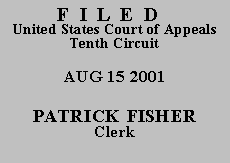

| CHERLYN VALERIE MCCLUNG, |
|
| v. | |
| UNITED STATES OF AMERICA, |
Cherlyn Valerie McClung, a federal prisoner appearing pro se, filed a petition for a writ of habeas corpus pursuant to 28 U.S.C. § 2255. The district court dismissed Ms. McClung's habeas petition, denied a certificate of appealability (COA), and denied Ms. McClung's motion to proceed in forma pauperis (IFP) on appeal. Ms. McClung appeals the dismissal of her petition and the denial of a COA, and also renews her motion to proceed IFP on appeal. We have jurisdiction pursuant to 28 U.S.C. § 1291. Because we conclude that Ms. McClung has not made a substantial showing of the denial of a constitutional right, we deny Ms. McClung's request for a COA. We also deny leave to proceed IFP, and dismiss this appeal.
Ms. McClung was charged in a twenty-five count federal indictment with various drug trafficking offenses, and pled guilty to two counts of traveling interstate in aid of racketeering. She was sentenced to two consecutive sixty-month terms of imprisonment. Ms. McClung then appealed to this court, arguing ineffective assistance of counsel, but we dismissed without prejudice on the ground that ineffective assistance of counsel claims should ordinarily be raised on collateral review. See United States v. McClung, No. 98-6337, 1999 WL 311674 (10th Cir. May 18, 1999) (citing United States v. Galloway, 56 F.3d 1239, 1242 (10th Cir. 1995) (en banc)).
Ms. McClung then filed a § 2255 petition with the district court, raising a number of issues regarding ineffective assistance of counsel. She alleged that the sentencing court denied her effective counsel when it denied her counsel's request for a continuance of her sentencing proceedings; that her appointed counsel should have requested a continuance to communicate with her retained counsel (when her retained counsel rejoined the case); that her counsel should have reviewed the presentence report with her at an earlier date; that her counsel should have moved for a downward departure (for various reasons); that her counsel should have objected to an enhancement for weapons possession; and that her counsel failed to timely file an appeal. The district court denied relief on all these claims, finding either that they lacked a basis in fact or that Ms. McClung had not been prejudiced thereby. See Rec. doc. 1, at 2-10 (Dist. Ct. Order, filed Aug. 25, 2000).
On appeal, Ms. McClung asserts four major categories of error. Two concern alleged prejudice arising from the failure to grant a continuance, one concerns counsel's alleged failure to object to an enhancement, and one concerns counsel's alleged failure to timely appeal. See Aplt's Br. at 5. Although we will not act as her advocate, we construe Ms. McClung's complaint liberally because she is proceeding pro se. See Haines v. Kerner, 404 U.S. 519, 520-21 (1972) (per curiam).
We review a claim of ineffective assistance of counsel de novo. See United States v. Prows, 118 F.3d 686, 691 (10th Cir. 1997). In order to obtain habeas relief for ineffective assistance of counsel, "a petitioner must establish both that his attorney's representation was deficient and that he was prejudiced by that deficiency." James v. Gibson, 211 F.3d 543, 555 (10th Cir. 2000) (citing Strickland v. Washington, 466 U.S. 668, 687 (1984)). A claim of ineffective counsel "may be resolved on either performance or prejudice grounds alone." United States v. Kennedy, 225 F.3d 1187, 1197 (10th Cir. 2000) (citation omitted). In order to show prejudice, a petitioner must show that "there is a reasonable probability that, but for counsel's unprofessional errors, the result of the proceeding would have been different. A reasonable probability is a probability sufficient to undermine confidence in the outcome." Id. (quoting Strickland, 466 U.S. at 694). There is a strong presumption that counsel provided effective assistance, and a § 2255 petitioner has the burden of proof to overcome that presumption. Id.
After reviewing Ms. McClung's brief and the appellate record, we find that Ms. McClung has clearly failed to overcome the presumption that her counsel provided effective assistance. Accordingly, for substantially the same reasons contained in the district court's August 25, 2000 Order, we DENY Ms. McClung a COA, as she has not made the "substantial showing of the denial of a constitutional right" required by 28 U.S.C. § 2253(c)(2). We further DENY Ms. McClung's motion to proceed in forma pauperis.
Entered for the Court,
Robert H. Henry
Circuit Judge
*. This order and judgment is not binding precedent, except under the doctrines of law of the case, res judicata, and collateral estoppel. The court generally disfavors the citation of orders and judgments; nevertheless, an order and judgment may be cited under the terms and conditions of 10th Cir. R. 36.3.